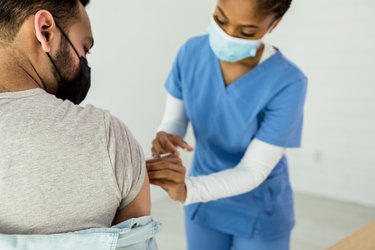
How'd you feel after? Is probably one of the most popular questions you'll hear after you get the COVID-19 vaccine. Swapping stories of side effects is kind of fun, and this is the only time when having nausea and chills is sort of cool. Especially because they're so short-lived for most people.
That said, new research in The Lancet Infectious Diseases found that less than one-quarter of people who got the Pfizer vaccine had systemic side effects, such as headache and fatigue, which was far lower rates than reported in clinical trials. (The study was done in the UK and also looked at the AstraZeneca vaccine, which is not available in the U.S.)
Video of the Day
Video of the Day
Get tips on how to stay healthy, safe and sane during the novel coronavirus pandemic.
In other words: If you were just fine, you're in good company. Here are other things you need to know about your nonreaction:
1. It Doesn’t Mean the Vaccine Didn’t ‘Work’
You got your first shot. Then your second. And…nada. Meh, maybe your arm hurt a little bit, but that ache quickly disappeared and, overall, was no big deal.
We keep hearing that having side effects is a good thing, because it indicates that the body's immune system is responding well to the injection and ramping up a response. So you may think that being free of side effects is a bad sign.
Here's some reassurance: "If you did not have side effects from the vaccine, it doesn't really mean anything," Luis Ostrosky-Zeichner, MD, infectious disease specialist at McGovern Medical School at UTHealth in Houston, tells LIVESTRONG.com. Side effects or no side effects, you likely still developed a strong immune response to the virus.
2. You Shouldn’t Go Get an Antibody Test
"I've seen patients who didn't have side effects after the vaccine and are disappointed and fearful. They ask about taking a test to measure their antibody levels," Dr. Ostrosky-Zeichner says.
The idea is that this test will let you know if you have had an antibody reaction and thus have immune protection against the virus. These tests are extremely easy to find.
One problem: "We don't know what the results mean," Dr. Ostrosky-Zeichner says. Most labs, he adds, run a qualitative test, meaning the results show if you do or do not have the antibodies at a certain level. But experts don't know what antibody level confers protection, and there are other types of immune cells that play a role, so doctors don't know what those tests actually tell you. Until they know more, hold off on this test.
3. It's Maybe Less Likely That You've Had COVID Before
This is a big if, but one to just toy around with: People who had a prior COVID-19 infection may have a more robust response to even the first dose of the vaccine, Dr. Ostrosky-Zeichner says. That might mean stronger side effects at the initial dose, and it may indicate that COVID survivors only need one dose, but this is an area of ongoing research.
Still, no matter if you had a COVID infection prior to the vaccine or think you may have, you still should not skip your second dose.
4. It Doesn’t Mean You Won’t Have Side Effects From Your Second Dose
If you're getting the two-dose Pfizer or Moderna vaccines, it's well-known that the first shot is less likely to trigger uncomfortable side effects compared to the second. The initial dose primes your body to recognize the spike protein and begins to build your body's immune response, per the Mayo Clinic News Network.
With the second dose, though, these antibodies are ready to respond — and they do. While 57 percent of people in Moderna clinical trials experienced a systemic reaction (fever, headache, chills, muscle aches) after dose one, 82 percent had this type of reaction after dose two. For the Pfizer vaccine, people were more likely to report fever, fatigue, headache, chills and muscle and joint pain following the second dose.
The lesson? Better prepare ahead of time. Take a planned sick day if you can, and relax, knowing you're not actually sick.
Read more stories to help you navigate the novel coronavirus:
- Centers for Disease Control and Prevention: “Possible Side Effects After Getting a COVID-19 Vaccine.”
- The Lancet Infectious Diseases: “Vaccine side-effects and SARS-CoV-2 infection after vaccination in users of the COVID Symptom Study app in the UK: a prospective observational study.”
- Mayo Clinic: “Understanding COVID-19 vaccine side effects, why second dose could feel worse.”
- Centers for Disease Control and Prevention: “Local Reactions, Systemic Reactions, Adverse Events, and Serious Adverse Events: Pfizer-BioNTech COVID-19 Vaccine.”
- Centers for Disease Control and Prevention: “Local Reactions, Systemic Reactions, Adverse Events, and Serious Adverse Event: Moderna COVID-19 Vaccine.”
Is this an emergency? If you are experiencing serious medical symptoms, please see the National Library of Medicine’s list of signs you need emergency medical attention or call 911.